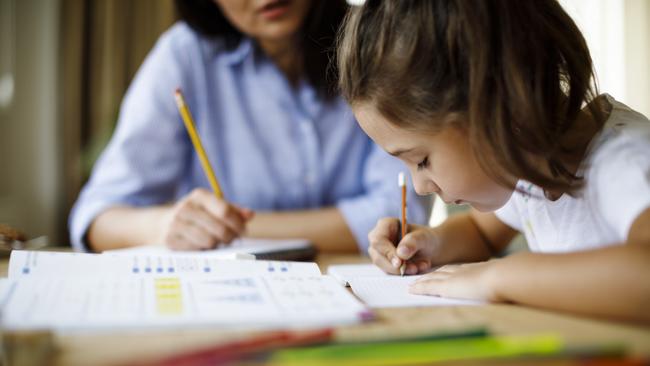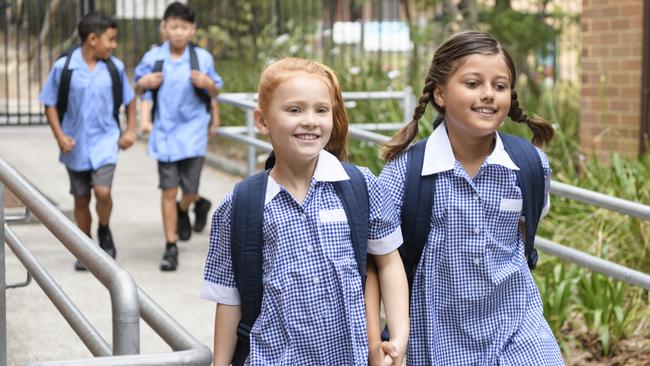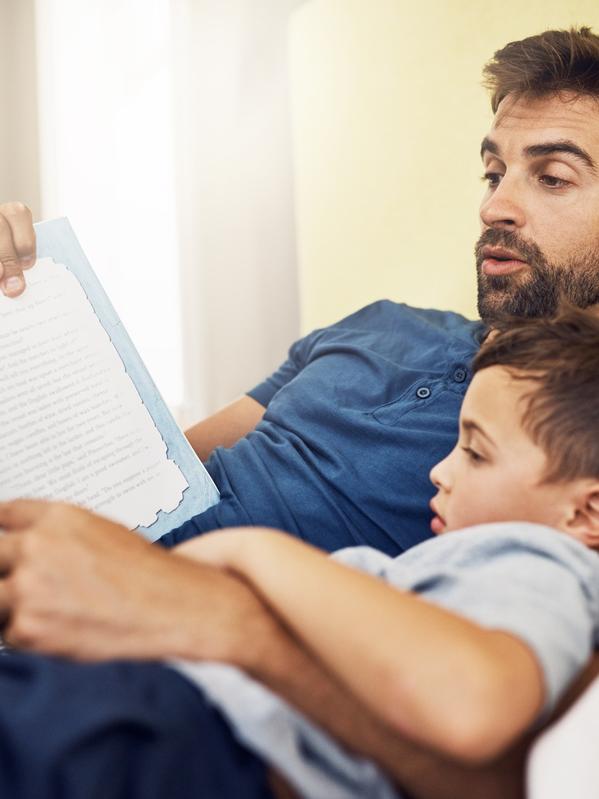How much is too much homework for first graders?
There are educators who say homework is a waste of time for primary schoolers. But this year some schools are recommending as much as 40 minutes a day for first graders. Is it too much?

A homework wish list of up to 40 minutes a day for first graders has been suggested by a Melbourne school.
Saltwater P-9 College says it is trying to balance the expectations, aspirations and needs of its families by clearly spelling out its homework policy.
Homework is a vexed issue for primary schools, teachers, parents and students with differing views on whether homework should be set and, if so, how much and how often.
In the past week, children at the Point Cook school started bringing home their first lot of homework for the year.
For Years 1 to 3 the school suggests an average of 20 to 40 minutes per night.
Years 4 to 6 are expected to complete an average of 40 to 50 minutes per night.
A survey of a number of primary schools showed that many were setting far less homework than Saltwater. One school suggested 10 minutes reading per night and 30 minutes of extra homework for Year 1 students per week.
Another suggested 15 minutes of reading a night and 5 minutes of numeracy for Year 1.
Saltwater founding principal Jackie Daniali told parents at the ambitious school, which is in its second year. The school was open to tailoring the homework demands for families.
“If you are having trouble completing set tasks with your children due to commitments to extra-curricular activities, or simply do not wish to support the school’s homework policy, then please speak to your child’s classroom teacher regarding differentiating the homework demands for your child,” she said.

“This recommendation is made to help students establish routines at home, as well as good study habits ready for further education.
“We encourage students to create a homework schedule that outlines the nights they are available to complete homework. This ensures students don’t feel overwhelmed and assists them in managing their time effectively.”
Leading parenting educator and author Justin Coulson said homework was a waste of time for primary school students.
The father of five said he sent a letter to teachers at the start of the year, saying his kids don’t do homework.
But he told the Herald Sun he did encourage them and other kids to read widely.
“At best homework is doing nothing and at worst is undermining children’s curiosity and love of learning and turning them against their schools,” he said.
He said there was little evidence that homework in primary school provides benefits.
“The assumption about homework is that children should be doing something productive, This misunderstands the essence of healthy childhood development,” he said.
“They should be reading, going to bed early and doing what kids do.”
He said students should not be overscheduled, ferried from one activity to another, aspire to be dux of grade one or most valued player for the soccer team.

Saltwater, which is creating a culture at the school which included the recent decision to acknowledge indigenous sports people such as Adam Goodes by naming its houses after them, said that each fortnight the homework will be writing, spelling, maths and the unit of inquiry when applicable.
“Depending on your child’s age, the amount of time spent on homework may differ. For each curriculum area, we have online applications that reinforce what your child is learning in class in both a fun and engaging way. The purpose of the homework is not to introduce new topics, but instead to consolidate your child’s understanding of topics taught within school hours,” the school said.
The homework will include independent reading which the school encourages families to track.
“As a Victorian government school, we are expected to document and share our homework expectations with our community, however, the decision to participate in homework tasks ultimately lies with the parents,” Ms Daniali said.
Parents Victoria executive officer Gail McHardy said homework had long been a contentious issue for families.
She said in primary school the current thinking was that homework to finish off school work and reading was fine but, for the most part, kids should be using after school time for socialising, playing sport and other extra curricular activities.
She said Parents’ Victoria feedback indicated that primary school homework caused stress and ate into family time.
Generally, primary school kids should get readers while year 5 and 6 children could do some literacy and numeracy revision, it said.
Ms McHardy said in 2000 Parents Victoria spoke to families about homework and it became clear that not all families, for social, cultural and other reasons, were able to manage homework.
“There was a definite view from the surveys that the prescribed times for homework were excessive,” she said, adding that she did not believe the situation had changed.
She said reading out of hours was the preferred homework and if there were to be any set projects these should be tasks to promote family and community engagement.
“Overall, the parents were not convinced there was evidence to suggest homework increased learning outcomes,” she said.
“Rather, homework expectations can create anxiety for students (and some other family members) unnecessarily.
“Some families are unable to support students for a number of reasons such as low literacy skills themselves, time poor and mental health.”
HOW MUCH HOMEWORK?
FITZROY NORTH PRIMARY SCHOOL
Prep to Year 4: Daily reading to and with carers/siblings.
Practising skills, gathering of extra information or materials. No time given.
Year 5-6: Daily independent reading and reflection. Extension of class work including projects, assignments, essays and research.
Recognises link between getting kids to develop responsibility for their own learning and organisation in readiness for secondary school but conscious of the need for the balance between work and play.
EXFORD PRIMARY SCHOOL
Reading:
Prep to Year 2: 10 minutes reading nightly
Years 3-4: Reading at least 15 minutes nightly
Years 5-6: Reading at least 20 minutes nightly.
Other homework:
Students will be allocated a homework book and this will include a statement regarding the purpose, the type of task and the timeline.
Classroom teachers will set weekly homework tasks (no more than 30-45 minutes per week, in addition to the nightly reading).
Prep-Year 4: Not exceed 30 minutes per week
Year 5-6: not exceed 30-45 minutes per week (during the school term only).
WESTGARTH PRIMARY SCHOOL
The schools says “measuring homework by the time spent doing it is an imprecise and inadequate measure that does not take into account the quality of the work or the ability of the student”.
However, it has an approximate guide.
Reading:
Prep-2: 15 minutes
Years 3-6: 20 minutes
Daily practice number facts:
Years 1-6: 5 minutes
Other tasks to a maximum of 40 minutes per week for students in years 5-6,
READ MORE:
TEENS CHARGED OVER SANDRINGHAM PRIMARY FIRE
